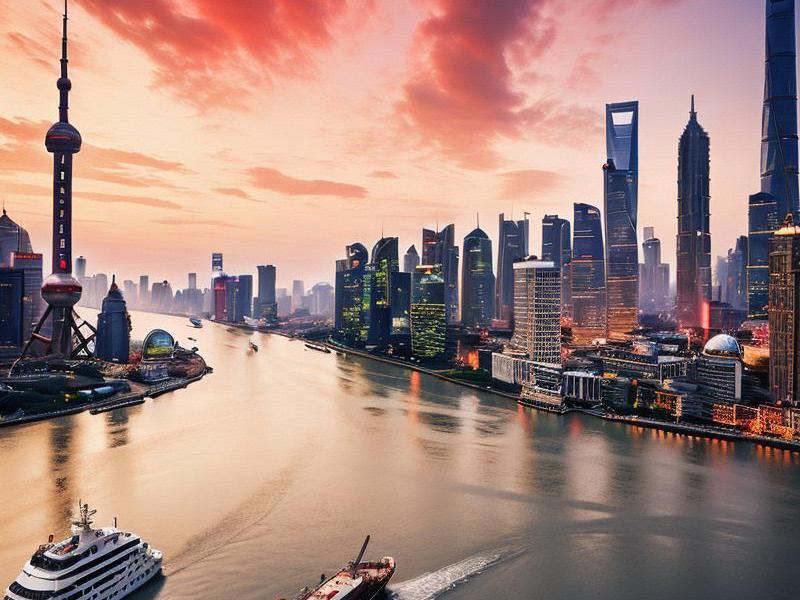
Shanghai, often referred to as the "Pearl of the Orient," stands as a beacon of China's economic and cultural progress. This vibrant metropolis, located on the eastern coast of China, is not only the largest city in the country but also a significant global financial hub. Over the past few decades, Shanghai has undergone a remarkable transformation, evolving from a historic port city into a modern metropolis that is a melting pot of tradition and innovation.
The history of Shanghai dates back thousands of years, with its strategic location along the Yangtze River Delta making it a crucial trading post for centuries. However, it was during the 19th century that Shanghai began to emerge as a major international city. The opening of treaty ports following the First Opium War allowed foreign powers to establish concessions in the city, leading to a blend of Western and Chinese architectural styles that can still be seen today.
In the 20th century, Shanghai became a symbol of China's modernization and industrialization. The city witnessed the rise of industries such as textiles, banking, and shipping, which attracted a diverse population of merchants, workers, and intellectuals from all over the world. This cosmopolitan atmosphere laid the foundation for Shanghai's reputation as a global city.
Today, Shanghai is recognized as one of the most dynamic and innovative cities in the world. Its rapid urban development has transformed the cityscape, with iconic landmarks such as the Oriental Pearl Tower, the Jin Mao Tower, and the Shanghai Tower symbolizing its modernity. These skyscrapers, along with the Bund and the Pudong New Area, showcase the city's blend of traditional Chinese architecture and cutting-edge modern design.
新上海龙凤419会所 The economic hub of Shanghai is unparalleled, with the city serving as the financial center of China and a major player in global trade. The Shanghai Stock Exchange is one of the largest in the world, and the city is home to numerous multinational corporations, financial institutions, and startups. The Pudong area, in particular, has become a symbol of China's economic reform and opening up, with its skyline dominated by the Shanghai Tower, the tallest building in China and the second-tallest in the world.
Shanghai's innovation ecosystem is thriving, with the city investing heavily in research and development, technology parks, and startups. The Zhangjiang Hi-Tech Park, for example, is a major center for biotechnology and information technology, attracting talent and investment from around the globe. The city's government has also implemented policies to foster entrepreneurship and innovation, making Shanghai a preferred destination for tech companies and startups.
Culturally, Shanghai is a vibrant city that celebrates its rich heritage while embracing modernity. The city is home to numerous museums, art galleries, theaters, and cultural festivals that showcase its diverse cultural offerings. The Shanghai Museum, for instance, is renowned for its extensive collection of Chinese art, including ancient ceramics, calligraphy, and paintings. The city's art scene is also flourishing, with galleries such as the Power Station of Art and the M50 Creative Park providing a platform for contemporary artists.
Shanghai's culinary scene is another aspect of its cultural identity, with the city offering a wide range of dining options that reflect its history and diversity. From traditional Shanghainese cuisine to international flavors, the city's restaurants cater to all tastes. The Bund and the French Concession are particularly popular for their dining experiences, with a mix of historic buildings and modern eateries creating a unique atmosphere.
上海贵族宝贝龙凤楼 The city's commitment to sustainability and green development is also noteworthy. Shanghai has implemented various initiatives to reduce its carbon footprint and promote environmental conservation. The city has invested in public transportation systems, including the metro and bus networks, to reduce traffic congestion and air pollution. Additionally, Shanghai has been promoting the use of renewable energy sources and implementing green building standards to crteeaa more sustainable urban environment.
Education is another area where Shanghai excels, with the city being home to some of the best universities and research institutions in China. Fudan University and Tongji University are among the top-ranked institutions in the country, attracting students and scholars from around the world. The city's education system emphasizes innovation and critical thinking, preparing its graduates to contribute to the global knowledge economy.
Shanghai's international influence is evident in its role as a host city for major global events. The city has hosted numerous international conferences, exhibitions, and sports events, including the World Expo in 2010, which attracted millions of visitors from around the world. These events not only showcase Shanghai's capabilities as a global city but also enhance its reputation as a hub for international cooperation and exchange.
419上海龙凤网 However, like any rapidly developing city, Shanghai faces challenges such as urbanization, environmental issues, and social inequality. The city's government is actively addressing these challenges through comprehensive urban planning, environmental protection measures, and social welfare programs. For example, the city has been promoting the development of satellite towns and suburban areas to alleviate congestion in the central urban area. Additionally, Shanghai is investing in green infrastructure and renewable energy projects to combat climate change and improve air quality.
The future of Shanghai is bright, with the city poised to continue its journey as a global leader in innovation, culture, and urban development. The Chinese government's Belt and Road Initiative, which aims to enhance connectivity and cooperation among countries along the ancient Silk Road, presents significant opportunities for Shanghai to further enhance its global influence. The city's strategic location and strong economic foundation make it a key player in this initiative.
In conclusion, Shanghai is a dynamic metropolis that embodies the spirit of China's transformation and progress. Its innovative spirit, rich cultural heritage, and rapid urban development make it a unique and influential city on the global stage. As Shanghai continues to evolve, it will undoubtedly remain a symbol of China's rise as a global power and a model for sustainable urban development.
